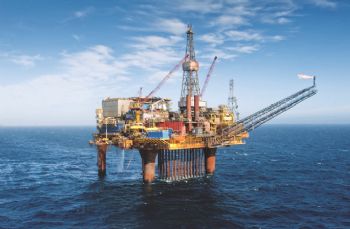
According to industry support group Oil & Gas UK, decommissioning activity is accelerating on the UK continental shelf. The number of fields expected to cease production during the period 2014-19 is now almost 80 (up 6% on last year’s figure), “as rising operating costs and lower oil prices have shortened fields’ economic life-spans”.
The organisation estimates that “the total decommissioning bill to 2040 has increased by around 11% to £46 billion”.
Speaking at a recent conference, Bill Cattanach — head of supply chain at the newly created Oil and Gas Authority — said that 23 decommissioning applications have been received so far this year and that “trans-formational change is needed to bring costs down”.
However, he added that “it may not come soon enough to help the dozen or so projects that are currently under way”.
Fairfield Energy’s Dunlin field in the northern North Sea (pictured) is the latest to move into decommissioning; production ceased in June.
Dunlin A, which sends oil to the Sullom Voe terminal on Shetland, will remain in operation for a while as a pumping station for oil from the Thistle field. It used to perform the same function for Canadian Natural’s Murchison field, until the latter ceased production last year. Fairfield estimates the overall decommissioning cost for Dunlin at around $600 million.
Meanwhile, Maersk is awaiting approval for its plan to decommission the sub-sea facilities of the Leadon field in the central North Sea, while Centrica has started work on the decommissioning of Stamford and Rose, two single-well sub-sea developments in the southern North Sea gas basin.
Bob Keiller, chief executive of the Aberdeen-based Wood Group, said: “These are tough times, and we will have to cut our cloth accordingly.”
Since December, 1,000 of Wood Group’s 11,000-strong UK workforce have left the business. Mr Keiller said that, despite the fall in the oil price, the North Sea is “still a vital part of the UK’s manufacturing future. We have a fantastic engineering skills base here in the UK. It creates high-quality job opportunities that can be exported to many different countries around the world.
“I have people in Aberdeen designing the most sophisticated sub-sea oil and gas developments for deep-water offshore projects in South America, Africa and elsewhere. These high-quality jobs can carry on way beyond the life of the North Sea. We need to work together to protect that skills base.”